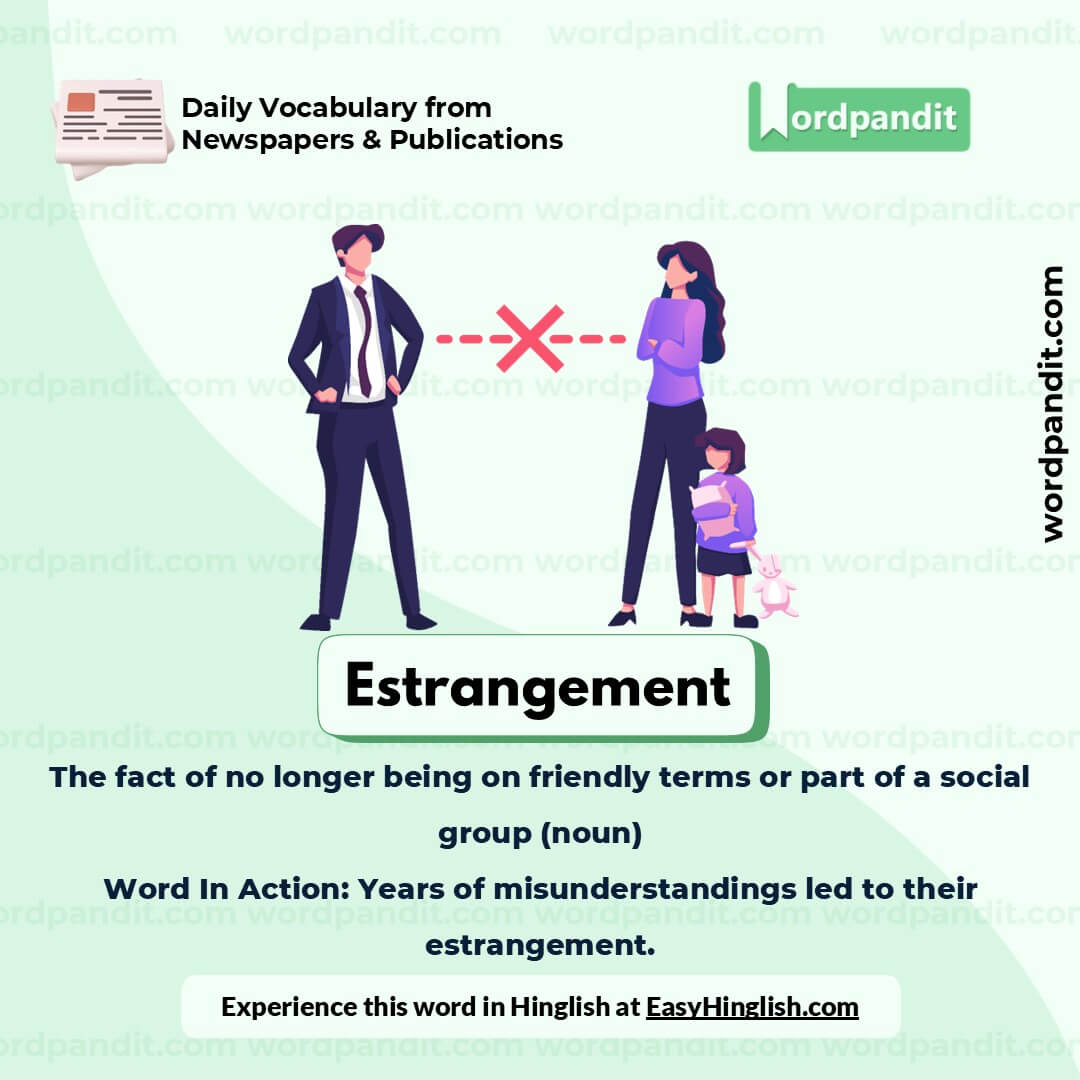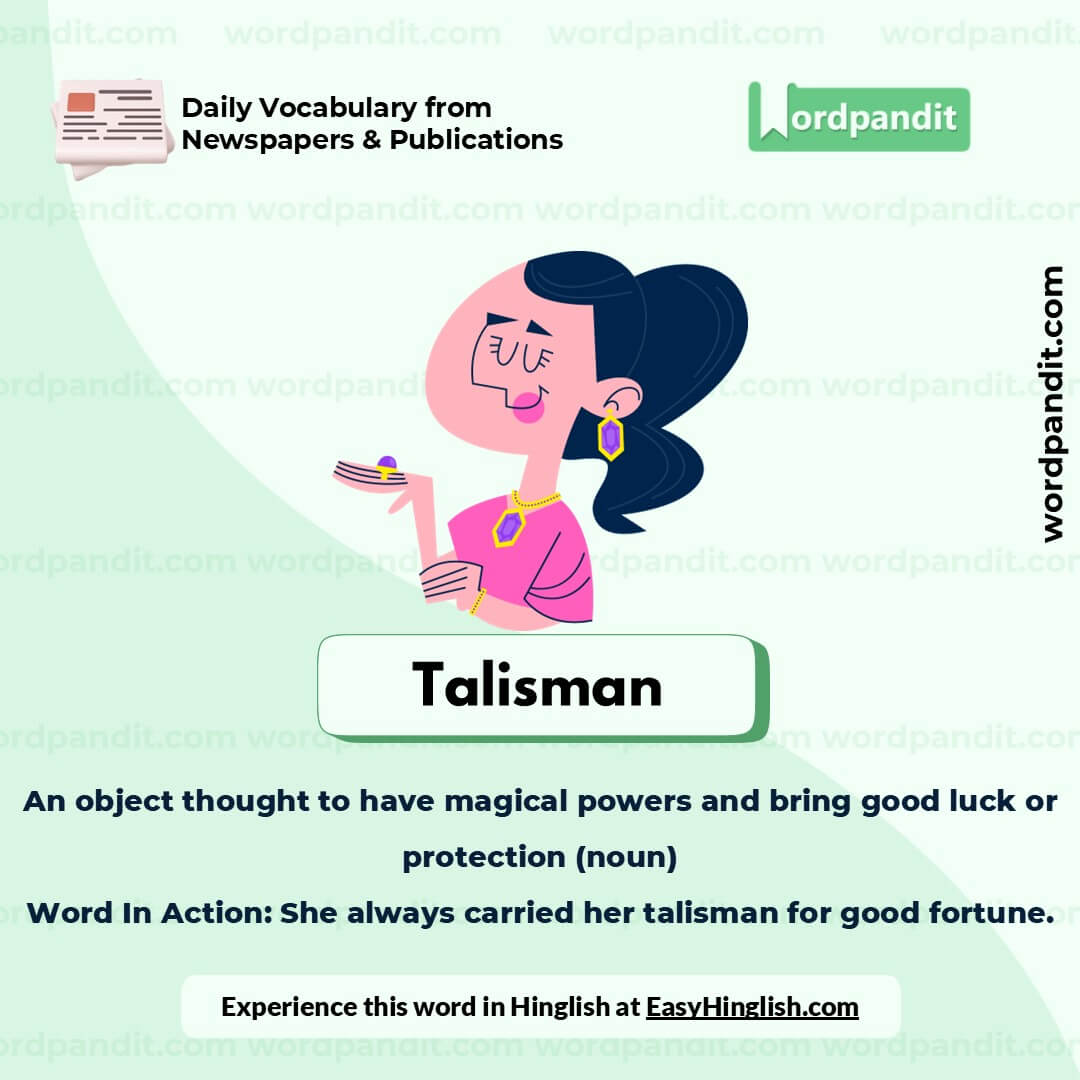Daily Vocabulary from International Newspapers and Publications
Expand Your Vocabulary with Wordpandit’s Global Vocabulary Hub
At Wordpandit, we are committed to helping you develop a truly global vocabulary by drawing from some of the most respected international publications. This section is designed to keep you ahead of the curve by introducing you to words that define global conversations and trends.
The Power of Global Sources
To help you think and communicate on a global scale, we curate vocabulary from renowned international sources, such as:
- The New York Times
- The Washington Post
- BBC
- The Guardian
- The Economist
- Scientific American
- Psychology Today
- And many more...
Stay Global, Stay Competitive
Our daily updates from international publications ensure you are consistently exposed to new words that reflect global news and developments, making sure your vocabulary is not only current but also globally relevant.
Enhance Your Global Perspective
Whether you’re preparing for international exams, aiming to excel in global business communication, or want to enhance your language skills for personal growth, Wordpandit offers the resources you need to thrive in a global context.
Effective Learning, Global Reach
Our learning methodology combines global examples, memory aids, and interactive activities, allowing you to internalize new words effectively and apply them in real-world scenarios.
Begin Your Global Vocabulary Journey Now!
Why Choose Wordpandit?
Practical Learning: Focus on words you'll actually encounter in real-world reading, enhancing your comprehension and communication skills.
Diverse Content: From current affairs to scientific breakthroughs, our varied sources expose you to vocabulary across multiple domains.
Effortless Integration: Make Wordpandit a part of your daily routine. Just a few minutes each day can significantly boost your lexicon over time.
Your Path to Vocabulary Mastery
- Visit our Daily Vocabulary section regularly
- Explore new words and their usage in context
- Practice incorporating these words into your own writing and speech
- Track your progress as your vocabulary expands
Start Your Journey Today
Embark on your vocabulary enhancement journey with Wordpandit. By consistently engaging with our daily posts, you'll build a robust vocabulary that serves you well in academic, professional, and personal contexts.
Remember, a word a day keeps linguistic limitations at bay. Make Wordpandit your daily companion in the quest for vocabulary excellence!
WORD-1: Estrangement
Context:
"The potential psychological estrangement from Washington as a seat of power." - The Washington Post
Explanatory Paragraph:
The word estrangement refers to the state of being separated or alienated from someone or something. It often describes emotional distance, where individuals or groups become detached from each other or from familiar environments, either physically, psychologically, or socially. Estrangement can occur between family members, friends, or even between people and institutions.
Meaning: The fact of no longer being on friendly terms or part of a social group (noun)
Pronunciation: ih-STREYNJ-muhnt
Difficulty Level: ⭐⭐⭐ (Intermediate)
Etymology: From Latin extraneare meaning "to treat as a stranger."
Synonyms & Antonyms:
Synonyms: alienation, separation, disaffection, detachment, division
Antonyms: reconciliation, closeness, connection, familiarity, unity
Usage Examples:
- Years of disagreements led to the estrangement between the siblings.
- Many citizens feel a sense of estrangement from their government due to lack of representation.
- Her estrangement from her childhood friends became evident after she moved abroad.
- The estrangement of the artist from mainstream society influenced his unique style.
Cultural Reference:
"The theme of estrangement is prevalent in literature, where characters often feel isolated or distanced from society, such as in Franz Kafka’s works." - Literary Analysis
Think About It:
Why do you think estrangement happens in relationships, and can it always be repaired, or are some estrangements permanent?
Quick Activity:
Think of a time when you experienced estrangement from someone or something. Write about the reasons and how it made you feel.
Memory Tip:
To remember "estrangement," think of "stranger." When you are estranged, you feel like a stranger to someone or something familiar.
Real-World Application:
Estrangement is common in family dynamics or politics, where disagreements or ideological differences create emotional distance between individuals or groups.
WORD-2: Talisman
Context:
"Indian treaties are not talismans. They’re contracts establishing government-to-government relationships." - The Washington Post
Explanatory Paragraph:
The word talismans refers to objects that are believed to have magical powers, especially ones that offer protection or bring good luck. A talisman is often seen as a symbolic item that people carry or keep with them for its supposed ability to ward off evil or attract positive energy. Though the term is rooted in mysticism, it can also be used metaphorically to describe anything that is thought to provide special influence or power.
Meaning: An object thought to have magical powers and bring good luck or protection (noun)
Pronunciation: TAL-iz-muhn
Difficulty Level: ⭐⭐⭐ (Intermediate)
Etymology: From Arabic tilsam meaning "charm" or "spell," which passed into French as talisman
Synonyms & Antonyms:
Synonyms: charm, amulet, lucky charm, fetish, totem
Antonyms: curse, jinx
Usage Examples:
- She always carried a small stone as her personal talisman for good luck.
- The ancient warriors believed their talismans would protect them in battle.
- The rabbit’s foot was considered a talisman by many for attracting fortune.
- In many cultures, talismans are used to ward off evil spirits and bring safety to their owners.
Cultural Reference:
"Talismans have appeared in many cultures throughout history, from ancient Egyptian scarabs to the horseshoes and four-leaf clovers of modern superstition." - Cultural Folklore
Think About It:
Why do you think people across cultures have placed so much belief in talismans? Do such objects offer real benefits, or is it the belief itself that holds the power?
Quick Activity:
Do you have an item that you consider your talisman? Write about why it’s special to you and whether you believe it brings you luck or comfort.
Memory Tip:
To remember "talisman," think of "magic man" — an object like a "magic" token believed to have special powers.
Real-World Application:
While talismans are often used in spiritual and cultural contexts, they are also commonly used in modern times as personal tokens of luck, offering comfort or confidence to their holders.
WORD-3: Vanguard
Context:
"These Black and Native veterans were in the vanguard of normalizing non-White, career military personnel." - The Washington Post
Explanatory Paragraph:
The word vanguard refers to the group of people or forces at the forefront of any movement, activity, or field. Originally a military term meaning the front part of an advancing army, it has evolved to describe those who are pioneers or leaders in advancing new ideas or changes in society. Being in the vanguard means being at the leading edge of progress or innovation.
Meaning: The forefront of an action, movement, or field (noun)
Pronunciation: VAN-gahrd
Difficulty Level: ⭐⭐⭐ (Intermediate)
Etymology: From Old French avant-garde meaning "foreguard" or "leading troops."
Synonyms & Antonyms:
Synonyms: forefront, cutting edge, leaders, pioneers, spearhead
Antonyms: rear, followers, laggards, rear guard
Usage Examples:
- The vanguard of the environmental movement is made up of young activists demanding immediate action on climate change.
- The company prides itself on being in the vanguard of technological innovation.
- Artists in the vanguard of modern art often challenge traditional forms and methods.
- The organization has always been in the vanguard of human rights advocacy.
Cultural Reference:
"The vanguard of change is often met with resistance, as those who push boundaries must challenge established norms and beliefs." - Sociological Theory
Think About It:
What qualities do you think people in the vanguard of a movement must have to succeed? Can anyone be part of the vanguard, or does it take a special kind of person?
Quick Activity:
Think of a movement or field that you are passionate about. Write about how you or others could be part of the vanguard of change in that area.
Memory Tip:
To remember "vanguard," think of "van" at the front — the vanguard leads the way just like the front of a vehicle.
Real-World Application:
The term "vanguard" is used today in various contexts, including business, technology, and social activism, where it refers to those leading the way in innovation, change, or development.
WORD-4: Frugal
Context:
"A frugal attempt to 'get more accomplished without additional funding.'" - The Washington Post
Explanatory Paragraph:
The word frugal refers to being economical with money or resources, using only what is necessary and avoiding waste. A frugal person or approach is one that seeks to accomplish goals without unnecessary spending, often finding creative or efficient ways to save. It is generally seen as a positive quality, associated with careful and wise use of resources.
Meaning: Sparing or economical in the use of resources, especially money (adjective)
Pronunciation: FROO-guhl
Difficulty Level: ⭐⭐⭐ (Intermediate)
Etymology: From Latin frugalis meaning "virtuous or thrifty," related to frux meaning "fruit" or "value."
Synonyms & Antonyms:
Synonyms: economical, thrifty, prudent, sparing, parsimonious
Antonyms: extravagant, lavish, wasteful, prodigal, spendthrift
Usage Examples:
- Living a frugal lifestyle allowed them to save enough money for their dream vacation.
- The company’s frugal management of resources helped it survive the economic downturn.
- They made frugal choices during the renovation to stay within budget.
- Her frugal nature means she never buys anything she doesn’t absolutely need.
Cultural Reference:
"Frugality has long been praised in many cultures, particularly in times of economic hardship, as a way to stretch limited resources." - Economic History Journal
Think About It:
In what ways can being frugal benefit not only individuals but also society as a whole, especially in times of crisis?
Quick Activity:
Write down three ways you can be more frugal in your daily life without sacrificing quality or comfort.
Memory Tip:
To remember "frugal," think of "fruit" — a frugal person makes sure nothing goes to waste, much like carefully using every part of a valuable resource.
Real-World Application:
Frugality is important in both personal and business contexts, helping people and organizations achieve goals with limited resources while avoiding unnecessary waste.
WORD-5: Proprietary
Context:
"It was for the proprietary right to make binding treaties with the territory’s Native nations." - The Washington Post
Explanatory Paragraph:
The word proprietary refers to ownership or possession of something, especially rights or products that are privately owned and controlled. A proprietary right or product is one that belongs exclusively to a specific person or organization and is not freely available to the public. This term often applies in legal, business, or technical contexts, where certain rights or information are restricted to the owner or inventor.
Meaning: Relating to ownership, especially of property or exclusive rights (adjective)
Pronunciation: pruh-PRY-uh-ter-ee
Difficulty Level: ⭐⭐⭐ (Intermediate)
Etymology: From Latin proprietarius meaning "owner," derived from proprietas meaning "ownership."
Synonyms & Antonyms:
Synonyms: ownership, exclusive, private, patented, restricted
Antonyms: public, shared, open-source, communal, non-exclusive
Usage Examples:
- The company holds proprietary rights to the software, meaning no one else can legally use or distribute it.
- The recipe is a proprietary secret, passed down through generations of the family.
- Several Native nations fought for their proprietary rights to the land.
- The firm’s proprietary technology gives it a competitive edge in the industry.
Cultural Reference:
"In the digital age, proprietary software often competes with open-source alternatives, creating debates about access, control, and innovation." - Technology & Society Journal
Think About It:
How do proprietary rights affect innovation and competition in different industries? Are there benefits to keeping certain technologies or ideas proprietary, or should they be shared?
Quick Activity:
Write about a situation where you think proprietary ownership is important (e.g., intellectual property or land rights) and explain why.
Memory Tip:
To remember "proprietary," think of "property" — proprietary rights are about having exclusive ownership of something.
Real-World Application:
Proprietary rights are important in various fields such as technology, law, and business, where they protect the ownership of inventions, products, or land from being used without permission.


















